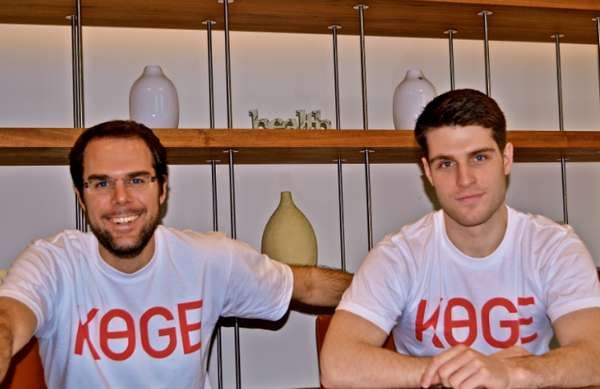
Changing the Industry
Tiana Reid — March 5, 2013 — Social Good
References: kogevitamins
Last month, SocialBusiness.org covered Køge, a vitamins company that is attempting to change the industry through its innovative business model. Here, instead of our usual profile, we talked to the founders, Alex Hyssen and Andrew Lenjosek, and learned more about how they came up with their idea and continue to stay inspired.
Four Questions with Alex Hyssen and Andrew Lenjosek
1. How did the idea for the business model come about?
Alex: Stanford was an incredible nurturing ground for up-and-coming companies. While I was there, I saw the rising trend of Internet-based consumer-related businesses and the effect they were having upon traditional retail. Drawing upon my own knowledge of the health and wellness industry, I thought the concept of cutting out the middleman and selling directly to the consumer was a smart and very much needed way to offer lower vitamin prices without sacrificing quality.
Andrew: While I was living in Manhattan, every meal I ate for over a year was some form of restaurant food or takeout. As I happened to be training for a marathon, I realized that the diet I was on wasn’t providing me with the energy I needed to train properly. I decided to visit a vitamin shop to find something that could supplement my needs, and upon walking into the store I was completely overwhelmed by the choice. I had absolutely no idea which product I should purchase and the sales associate seemed to only specialize at suggesting the most overpriced products. This is what sparked my idea to focus on offering customers simple and customized vitamin solutions.
2. How did you decide to join this sector?
Alex: I’ve had a lot of experience working in the health and wellness industry over the past several years, and I noticed how much the industry lacked improvement/innovation. Vitamin shops have been very traditional from a distribution standpoint for as long as I can remember, and Internet distribution is a new and up-and-coming segment that I believe is going to dominate the market in years to come.
Andrew: As an investment banking analyst, I spent a good amount of time working on healthcare projects, where I was able to intimately study vitamin companies and learn how they operated from a strategic and financial perspective. I also have been quite involved with philanthropy and I have always admired projects like the Clinton Foundation’s Health Access Initiative. I feel that businesses ought to contribute back to society and I feel that there are many things to offer citizens in developing nations that can substantially improve their quality of life. When I learned about Vitamin Angel, the organization we’re working with to distribute vitamins to children suffering from malnutrition, I felt they were a perfect fit for our company.
3. How do you get your inspiration?
Andrew and Alex: The core of our start-up is based on the belief that consumers perceive vitamins to be too expensive and that consumers are overwhelmed by the number of product choices available. In order to test this hypothesis, Alex and I spent many days talking to people at shopping malls around Toronto. We interviewed them to get a sense of their spending habits, lifestyles, types of vitamins taken, and opinions on issues like product confusion. Once we aggregated the information, the results were outstanding. We saw that an overwhelming majority of consumers felt our solution was something they would absolutely value and we saw that there was a lot of frustration with the status quo. Alex and I were inspired by these results and it really affirmed our decision to start Køge.
4. How do you reset yourself to be creative? Do you have any rituals
Alex: I subscribe to numerous magazines similar to Fast Company and Inc., as they provide incredible content regarding innovation occurring in many industries. After I read these publications and see what’s trending within various sectors, I push myself to think of ways to incorporate these new ideas within Køge.
Andrew: I’m more of a numbers and analytics kind of guy. I’m not sure there’s a creative bone in my body, so I leave that sort of thing to Alex!
Four Questions with Alex Hyssen and Andrew Lenjosek
1. How did the idea for the business model come about?
Alex: Stanford was an incredible nurturing ground for up-and-coming companies. While I was there, I saw the rising trend of Internet-based consumer-related businesses and the effect they were having upon traditional retail. Drawing upon my own knowledge of the health and wellness industry, I thought the concept of cutting out the middleman and selling directly to the consumer was a smart and very much needed way to offer lower vitamin prices without sacrificing quality.
Andrew: While I was living in Manhattan, every meal I ate for over a year was some form of restaurant food or takeout. As I happened to be training for a marathon, I realized that the diet I was on wasn’t providing me with the energy I needed to train properly. I decided to visit a vitamin shop to find something that could supplement my needs, and upon walking into the store I was completely overwhelmed by the choice. I had absolutely no idea which product I should purchase and the sales associate seemed to only specialize at suggesting the most overpriced products. This is what sparked my idea to focus on offering customers simple and customized vitamin solutions.
2. How did you decide to join this sector?
Alex: I’ve had a lot of experience working in the health and wellness industry over the past several years, and I noticed how much the industry lacked improvement/innovation. Vitamin shops have been very traditional from a distribution standpoint for as long as I can remember, and Internet distribution is a new and up-and-coming segment that I believe is going to dominate the market in years to come.
Andrew: As an investment banking analyst, I spent a good amount of time working on healthcare projects, where I was able to intimately study vitamin companies and learn how they operated from a strategic and financial perspective. I also have been quite involved with philanthropy and I have always admired projects like the Clinton Foundation’s Health Access Initiative. I feel that businesses ought to contribute back to society and I feel that there are many things to offer citizens in developing nations that can substantially improve their quality of life. When I learned about Vitamin Angel, the organization we’re working with to distribute vitamins to children suffering from malnutrition, I felt they were a perfect fit for our company.
3. How do you get your inspiration?
Andrew and Alex: The core of our start-up is based on the belief that consumers perceive vitamins to be too expensive and that consumers are overwhelmed by the number of product choices available. In order to test this hypothesis, Alex and I spent many days talking to people at shopping malls around Toronto. We interviewed them to get a sense of their spending habits, lifestyles, types of vitamins taken, and opinions on issues like product confusion. Once we aggregated the information, the results were outstanding. We saw that an overwhelming majority of consumers felt our solution was something they would absolutely value and we saw that there was a lot of frustration with the status quo. Alex and I were inspired by these results and it really affirmed our decision to start Køge.
4. How do you reset yourself to be creative? Do you have any rituals
Alex: I subscribe to numerous magazines similar to Fast Company and Inc., as they provide incredible content regarding innovation occurring in many industries. After I read these publications and see what’s trending within various sectors, I push myself to think of ways to incorporate these new ideas within Køge.
Andrew: I’m more of a numbers and analytics kind of guy. I’m not sure there’s a creative bone in my body, so I leave that sort of thing to Alex!
Trend Themes
1. Internet Distribution of Vitamins - Koge Vitamins' business model focuses on selling vitamins directly to consumers through Internet distribution.
2. Customized Vitamin Solutions - Koge Vitamins aims to offer customers simple and customized vitamin solutions.
3. Philanthropic Business Partnerships - Koge Vitamins has partnered with Vitamin Angel to distribute vitamins to children suffering from malnutrition, demonstrating the potential of philanthropic business partnerships.
Industry Implications
1. Health and Wellness - Koge Vitamins operates in the health and wellness industry, which is ripe for innovation and disruption through new business models.
2. E-commerce - Koge Vitamins' Internet-based consumer-related business model represents a disruptive innovation opportunity within the e-commerce industry.
3. Philanthropy - Koge Vitamins' partnership with Vitamin Angel demonstrates the potential for businesses to contribute to philanthropic causes, opening up opportunities in the philanthropy industry for disruptive innovation.
4.9
Score
Popularity
Activity
Freshness























